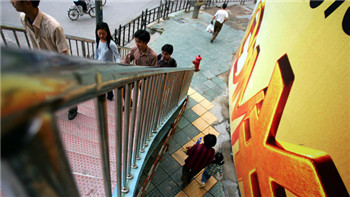
This time last year, the biggest early-day news about the renminbi appeared to be an announcement of a new, improved Rmb100 note to fight counterfeiting. It was until China’s central bank fixed the currency 1.9 per cent weaker than it had the previous day.
去年今日的早上,有关人民币的最大新闻似乎是有关新版100元面额人民币将有助于防伪的消息。随后传出一条更大的新闻:中国央行(PBoC)把人民币兑美元汇率中间价较前一日下调1.9%。
Traders were so stunned they initially thought there was something wrong with their hearing.
交易员们如此震惊,以至于他们最初以为自己的听力出了问题。
That change in the daily fix, around which the onshore renminbi trades 2 per cent either side, was five times the size of any fix move by the People’s Bank of China before then, and is still twice the size of any change since the turmoil it triggered.
那次人民币汇率中间价——在岸汇率每天波动幅度被限定在中间价上下2%的范围内——的降幅,是此前中国央行最大中间价调整幅度的5倍,并且仍是自那次调整引发动荡以来最大变动幅度的两倍。
One year on, the renminbi market is more or less calm once more as those speculating on further falls have either given up or found more profitable bets elsewhere.
一年后的今天,随着很多猜测人民币进一步下跌的人要么已经死心、要么找到了其他更有利可图的打赌对象,人民币市场差不多恢复了平静。
But that would not be the case without the events of last August, which forced the PBoC to communicate better, and taught many investors that alongside the old maxim “don’t fight the Fed” they should perhaps add another: “don’t push the PBoC”.
但是,如果没有去年8月那场风波,情况不会是现在的样子。那场风波迫使中国央行改进沟通,并使很多投资者领悟到:除了古老的格言“不要与美联储(Fed)对着干”以外,他们或许还应该再加上一条:“不要逼中国央行”。
“The motive [for currency reform] was right but they fumbled the process [last August], and they’ve learnt a lot since,” says David Mahon, chairman of Mahon Beijing Investment Management Advisors. “Western observers make too much of what they see as currency manipulation. This [suspicion] comes from a lack of understanding of the Chinese economy.”
“(汇改的)动机没错,但是(去年8月)他们搞砸了这个过程,自那以来他们学到了很多经验,”马鸿(北京)投资管理顾问公司(Mahon Beijing Investment Management Advisors)董事长马大伟(David Mahon)表示,“西方观察人士太过纠结于他们眼里的汇率操纵行为。这种(疑心)源自对中国经济缺乏理解。”
The PBoC’s increased willingness to communicate is the biggest change. On August 11th, the momentous fixing was accompanied by a very brief statement that talked only of a “one-time adjustment” and a shift — with no details — to a market-focused regime.
中国央行的沟通意愿增加是最大变化。去年8月11日的那次重大调整伴随着一份非常简短的声明,只表示此举是为了完善人民币市场化机制而进行的“一次性校正”和变动,没有细节。
That limited information prompted fears the depreciation was really a sign China’s economy was in far worse state than realised and that the PBoC’s control over capital flows could be cracking.
这一有限的信息促使外界担忧,那次贬值是中国经济比人们预想的要糟糕得多的一个标志,而中国央行对资本流动的管制可能正在出现裂缝。
They also worried that China was opening a new front in the currency wars, seeking competitive devaluation to bolster its exports.
他们还担心,中国正在汇率战争中开辟一条新战线,寻求竞争性贬值来提振出口。
“The market impact was clearly underestimated by policymakers,” says Mansoor Mohi-uddin, senior markets strategist at RBS. “They’ve had to change a lot since then.”
“政策制定者显然低估了对市场造成的冲击,”苏格兰皇家银行(RBS)高级市场策略师曼苏尔•莫希-乌丁(Mansoor Mohi-uddin)表示。“自那以来,他们不得不做出很大改变。”
Communications have developed in several steps. In December the PBoC began publishing the composition of the basket of currencies against which it tracks the renminbi. Analysts have since mostly concluded that the central bank does follow market pricing in setting the renminbi fix — at least, to a far greater degree than before, and so long as it suits it to.
沟通分几步发展。去年12月,中国央行开始公布其追踪人民币汇率时参考的一篮子货币的构成。自那以来,多数分析师得出的结论是中国央行在设定人民币中间价时确实在遵循市场定价——至少比以前在更大程度上遵循市场,而且只要这么做符合当局的意图。
Talking publicly was a bigger ask: except for a brief appearance in September, Zhou Xiaochuan, the PBoC governor, only broke silence in February, in a magazine interview. That only came following heavy criticism of January’s tumbling renminbi that in turn produced fresh global turmoil.
公开发表谈话则是更大的奢求:除了去年9月的一次短暂露面,中国央行行长周小川直至今年2月接受一家杂志采访时才打破沉默——这还是在1月人民币汇率大跌引发新一轮全球动荡、招致各方批评后才发生的。
“PBoC officials have stepped up their communication game,” says Frederic Neumann, head of Asian economic research at HSBC. “They [have] let investors understand that [currency reform] is about flexibility, not an opening shot in the global currency wars.”
“中国央行官员已经加强了他们的沟通,”汇丰(HSBC)亚洲经济研究主管范力民(Frederic Neumann)说,“他们(已经)让投资者明白(汇率改革)关乎弹性,而非打响全球汇率战的第一枪。”
The central bank has also demonstrated it is prepared to play hard ball. In January, heavy intervention in the offshore market hurt short-sellers and stemmed the renminbi’s fall. Meanwhile, new reserve requirements, imposed on offshore deposits for the first time, sent short-term renminbi borrowing rates in Hong Kong negative for a day by the end of March. The result was the renminbi ended the quarter stronger.
中国央行也证明了其已经准备好打硬仗。今年1月,对离岸市场的大举干预打击了空头,阻止了人民币下跌。与此同时,首次对离岸人民币存款执行新的准备金要求,使得香港短期人民币借款利率在3月底的一天跌至负值。其结果是人民币在结束第一季度之际走强。
Bearish bets now appear to have been rethought to the extent that last month, when the renminbi slipped to five-year lows, it was not met with anything like the same fevered reaction as last August.
看跌人民币的投机者似乎已改变主意,以至于上月人民币汇率跌至5年低点时,市场并未出现去年8月的那种激烈反应。
The PBoC’s actions have also made it clear that China maintains a strong grip on its capital account.
中国央行的举措也明确表明,中国依然有力管制着资本账户。
After its FX reserves fell by more than $100bn in both December and January, bolstering the case for renminbi bears, subsequent outflows slowed sharply amid reports China was tightening its controls in several ways.
在去年12月和今年1月,中国外汇储备分别下降逾1000亿美元,这支持了看跌人民币的理由。但随后资本外流急剧放缓,有报道称中国通过多种方式收紧管制。
Some of these enforced existing rules. While approval had always been needed from the State Administration of Foreign Exchange for big overseas acquisitions, there was now a sense that “you really had to have a deal worth prioritising above other outbound investments”, according to one source.
其中一些方式是执行现有规则。一位消息人士称,尽管大型海外收购始终需要获得中国国家外汇管理局(SAFE)的批准,但现在人们感觉,“你真的需要有一笔值得优先于其他对外投资的交易”。
New measures have also been brought in: from February, the PBoC started capping the transactions of mainlanders buying life insurance in Hong Kong to stop them from exploiting a loophole to move funds offshore.
中国还出台了新的措施:从今年2月开始,中国央行开始为内地人士在香港购买人寿保险的交易设置上限,以阻止他们利用漏洞向海外转移资金。
SAFE stopped allocating quotas allowing domestic investors to invest abroad, and stopped its launch of the second Qualified Domestic Institutional Investor scheme that allows domestic investors to buy equity abroad.
外管局不再向国内投资者授予海外投资额度,并停止开展第二批合格境内机构投资者(QDII)项目。QDII项目允许国内投资者在国外购买股票。
Officials also began encouraging big banks and would-be acquirers of foreign companies to borrow in dollars to create cash pools offshore rather than move existing renminbi.
官员们也开始鼓励大型银行和外国企业的潜在收购方借入美元以创建离岸资金池,而不是将现有人民币资金转移出去。
The final reason for the lack of recent upsets may simply be that other crises have emerged elsewhere.
最近没有风波的最后一个原因可能是全球其他地区爆发了其他危机。
“People have become distracted: global events such as Brexit have meant there’s less attention and scrutiny of the PBoC’s management of the renminbi,” says Mr Mahon.
马大伟表示:“人们已经分散了注意力:英国退欧等全球性事件意味着,中国央行管理人民币受到的关注和审视减少了。”
In spite of its improved communications and market-focused currency management, that is something the PBoC is likely to welcome.
尽管中国央行加强了沟通,并致力于市场化汇率管理,但它仍可能欢迎全球大格局的这种变化。












